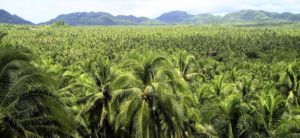Coconut Oil May be Environmentally & Socially Unsustainable
By Emily Powell
If you’re paying attention to national food fads, or you shop at Whole Foods, or you subscribe to any sort of social or broadcasting media, you’ve probably seen coconut oil advertised a time or two. Coconut oil, praised by certain media entities for its heart health benefits and beauty care benefits, has been somewhat controversial in clinical studies. The academic disagreement persists on whether or not the exceptionally high percentage of saturated fats in coconut oil have the same negative effects as saturated fat found in animal products such as red meat and cheese (or whether they have negative effects at all). But beyond the nutritional debate on coconut oil, I urge you to look at more than the immediate consumption effects, and ask the hard questions. Are the producers abiding by environmental sustainability principles? Are they being paid enough? How has the national obsession with coconut oil impacted the international market, and is it a sustainable choice? Let’s discuss.
Publicly available information on the environmental effects of coconut palm agriculture is limited, but it is safe to make some assumptions. For example, deforestation in tropical areas that support coconut palm growth limits biodiversity, promotes soil erosion, alters soil nutrient composition, and creates a rift in the regional ecosystem that can affect life-giving ecosystem services such as water filtration and land arability. This is also true for palm oil production. Additionally, as researchers at Stanford have concluded, coconut palms are not preferential nesting sites for keystone seabird species. Because the nesting patterns of seabirds and their guano provide instrumental nutrients for the soil beneath them, the increasing presence of coconut oil palms has limited the richness of nutrients in soil and changed the habitation patterns of terrestrial foragers.
Most of the world’s coconuts are grown in the Philippines, where coconut palm agriculture accounts for nearly 26% of the country’s total land use, yet, according to Philippine government figures, over 60% of coconut producers live below the poverty line. This is because, according to The Guardian, coconut farmers are paid $0.12-$0.25 per coconut, leaving them with $72-$7,000 per year, which lies far below the cost of technologies and resources that are needed in production, and far below the necessary income needed to support a family. By contrast, the average serving of coconut water costs $1.50 in the United States. This means that with all of their yearly earnings, coconut farmers in the lowest income bracket of $72 would be able to buy only 48 servings of their own product per year. So, in short, these farmers are paid far less than they should be paid. Unfortunately, however, this is nothing new in the world of exotic foreign agriculture (think: coffee, cocoa, palm oil).
Buying products that are grown and manufactured in other countries is a tricky business when it comes to choosing sustainability. This is because it becomes increasingly difficult to trace the supply chain and determine precisely who grew it and how it was grown. However, the recent development of a sustainability certification and training program for coconut palm farmers in the Philippines, partially funded by Dutch government corporation GIZ, materials producer BASF, and agricultural conglomerate Carhill, has greatly improved the prospective future of sustainable coconut oil production. Since the project started in 2011, thousands of small-scale farmers have been trained on sustainable agricultural practices, including intercropping, proper fertilizer use, and replanting, and other Sustainable Agriculture Network programs. Now, more than 300 small-scale farmers actively produce the world’s first Rainforest Alliance-certified dried coconut meat that abides by the Sustainable Agriculture Network’s principles. While the implementation of sustainable coconut oil production has a long way to go to reach global influence, this result of this certification program demonstrates that consumer interest in sustainable food products can yield international change. So I urge you to continue to be aware of the societal, environmental and economic impacts of your consumer choices. Look for sustainability certifications, buy local, and educate yourself on the true benefits of foods before buying into national fads. We need your help and your dollar to spark positive international agricultural change.
 Emily’s exuberant passion for sustainability and sustainable nutrition stems from her everlasting love for the outdoors, people, dirt, and broccoli. As an undergraduate in the School of Sustainability at Arizona State University, Emily is working towards becoming a spokesperson for everyday sustainable food and lifestyle choices, including decisions on what foods you buy, where you buy them, and how you make the most of foods’ energy. Leveraging communication through writing, Emily has been recognized in competitions such as the DuPont Challenge and the Apprentice Ecologist Initiative for her essays on sustainability issues and initiatives, including Honeybee Colony Collapse Disorder and community gardens in elementary schools. Emily aspires to utilize relationships with other academic disciplines to plant the seeds of sustainability and nutrition principles in the young adults of her generation. She plans to earn her Registered Dietitian credential and work either on the community or personalized sustainable nutrition level.
Emily’s exuberant passion for sustainability and sustainable nutrition stems from her everlasting love for the outdoors, people, dirt, and broccoli. As an undergraduate in the School of Sustainability at Arizona State University, Emily is working towards becoming a spokesperson for everyday sustainable food and lifestyle choices, including decisions on what foods you buy, where you buy them, and how you make the most of foods’ energy. Leveraging communication through writing, Emily has been recognized in competitions such as the DuPont Challenge and the Apprentice Ecologist Initiative for her essays on sustainability issues and initiatives, including Honeybee Colony Collapse Disorder and community gardens in elementary schools. Emily aspires to utilize relationships with other academic disciplines to plant the seeds of sustainability and nutrition principles in the young adults of her generation. She plans to earn her Registered Dietitian credential and work either on the community or personalized sustainable nutrition level.







